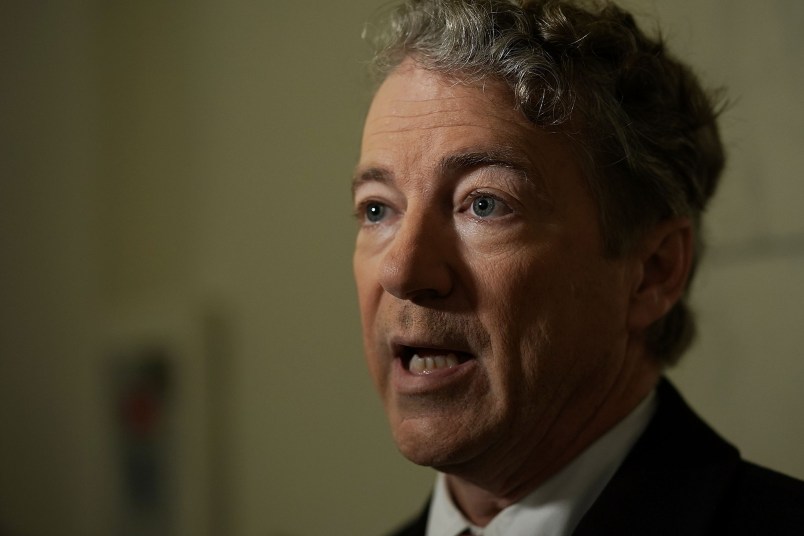Sen. Rand Paul (R-KY) ignored bipartisan pleas by Senate leaders to not delay a Thursday vote on a massive government spending bill, with a deadline to keep the government open coming at midnight.
Paul used a procedural move to stall the legislation — the result of a major bipartisan budget deal — from coming up for a vote. In a feisty speech from the Senate floor, he demanded a vote for an amendment he is pushing that would restore budget caps that the spending deal seeks to lift.
“I ran for office because I was very critical of President Obama’s trillion-dollar deficits. Now we have Republicans hand-in-hand with Democrats offering us trillion-dollar deficits,” Paul said. “I can’t in all good honesty and all good faith just look the other way because my party is now complicit in the deficits.”
He brought with him to the Senate floor a number of signs, suggesting he is prepared for the long-haul in his floor remarks.
Just before Paul objected to Senate Majority Leader Mitch McConnell’s (R-KY) move to call a vote, the Majority leader as well as his Democratic counterpart pleaded with him to accept a vote on a procedural move, a budget point of order, instead.
“I understand my friend and colleague from Kentucky does not join the President in supporting the bill, and it’s his right, of course, to vote against the bill, but I would argue that it’s time to vote,” McConnell said.
Minority Leader Chuck Schumer (D-NY) noted that members of his caucus had their own amendments that they would prefer to bring up for a vote.
“It’s hard to make an argument that if one person gets an amendment, that everybody else won’t want an amendment, and then we’ll be here for a very long time,” Schumer said.
McConnell was seeking what’s known as “unanimous consent” to push up a vote on the bill to 6 p.m., a few hours before it the legislation had met the 30 hours of debate required for a vote. (It is typical for those 30-hour periods to be cut short using unanimous consent motions). It only takes one senator to block unanimous consent, an opportunity Paul took to take stand against the legislation.
“This is the most important debate we will have in the year over spending, and no amendments are allowed,” Paul said, while calling the argument that other lawmakers would then want their amendments voted on “canard”
“We’ve been open for business ten hours today. You can do four amendments an hour. We could have done 40 amendments,” Paul said.
If Paul holds firm, then the Senate will not be able to vote on advancing the spending legislation until 1 a.m., technically an hour after the previous funding bill has lapsed, with a final Senate vote on it after. The House would still need to vote on the spending bill after that before it was sent to President Trump for his signature.
Paul’s gambit is just the latest of a series of twists that spending legislation has faced since the deal was unveiled. A group of House conservatives are opposed to the bill, citing similar concerns to Paul’s about growing the deficit. That means House Speaker Paul Ryan will likely need the votes of Democrats, who are mixed on supporting spending legislation that does not include a clear path for passing legislation to protect the DACA program for undocumented immigrants brought to the U.S. as children.







I guess some calls can be made during “executive time”.
It’s nice to see McConnell slowly getting over his reluctance to allow things to come to a vote.
Paging Dr. Boucher.
Dr. Boucher to the Senate please…
Silly boy. Deficits only matter when a Democrat is President. Everyone knows that. It was explained to us long ago by Richard “big dick” Cheney.
He, and all the Reagan worshippers missed what Ronald Reagan did to the National Deficit after campaigning on a Balanced Budget Amendment and wanting a Line Item Veto.
The fucking NERVE of this sonofabitch.